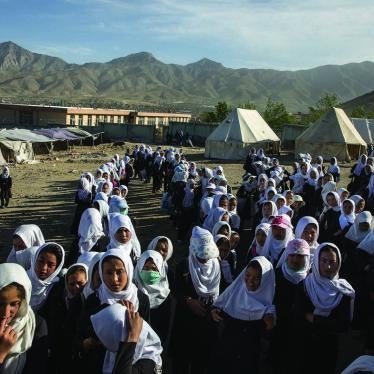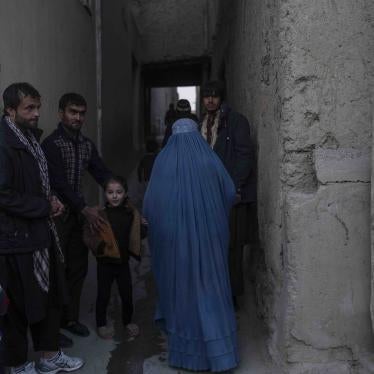(New York) – International donors seeking to fund education for girls and women in Afghanistan should carefully consider and address the human rights concerns, Human Rights Watch said in a report released today. The Taliban have said that they will reopen all girls’ secondary schools on March 23, 2022.
The 13-page report, “Four Ways to Support Girls’ Access to Education in Afghanistan,” outlines key ways that donors should promote human rights in their engagement with the Taliban’s education system. Donors should support full access to quality education for Afghan girls and women, which requires examining the situation in schools and standing by activists and communities that are fighting for everyone’s right to education.
“Access to education is about much more than whether the gate in front of the school is unlocked,” said Heather Barr, associate women’s rights director at Human Rights Watch. “Donors need to find ways to induce the Taliban to respect the rights of girls and women to education.”
After taking power on August 15, 2021, the Taliban ordered the reopening of boys’ secondary schools on September 18, but did not mention girls’ schools. Most girls’ secondary schools have remained closed since August, depriving most adolescent girls of access to education. This is one of the Taliban’s many violations of girls and women’s rights since they gained control of the country.
Simply reopening schools will not ensure access to quality education, Human Rights Watch said. Girls and women face numerous barriers including fears of violence, surveillance, and intimidation from the Taliban within schools, a lack of teachers due to salaries not being paid, Taliban changes to the curriculum, and the impact of the humanitarian crisis gripping the country.
Donors should consider the broader human rights environment for women and girls and whether it enables and incentivizes education, Human Rights Watch said. The Taliban have banned women from paid employment in most professions, except as educators for girls and healthcare providers for women. Taliban forces have also threatened, harassed, beaten, and detained protesters who have called for the rights to education and to work.
Donors should raise human rights concerns directly with Taliban authorities. They should communicate clearly that assistance for education will depend on local situations but will not be designated for areas where the authorities are restricting women and girls from going to school and obtaining a livelihood.
“Why would you and your family make huge sacrifices for you to study if you can never have the career you dreamed of,” said Sahar Fetrat, an Afghan human rights activist who is an assistant researcher at Human Rights Watch. “Reopening girls’ secondary schools in Afghanistan is a crucial step, but it will not be enough to ensure access to education for girls and women.”









